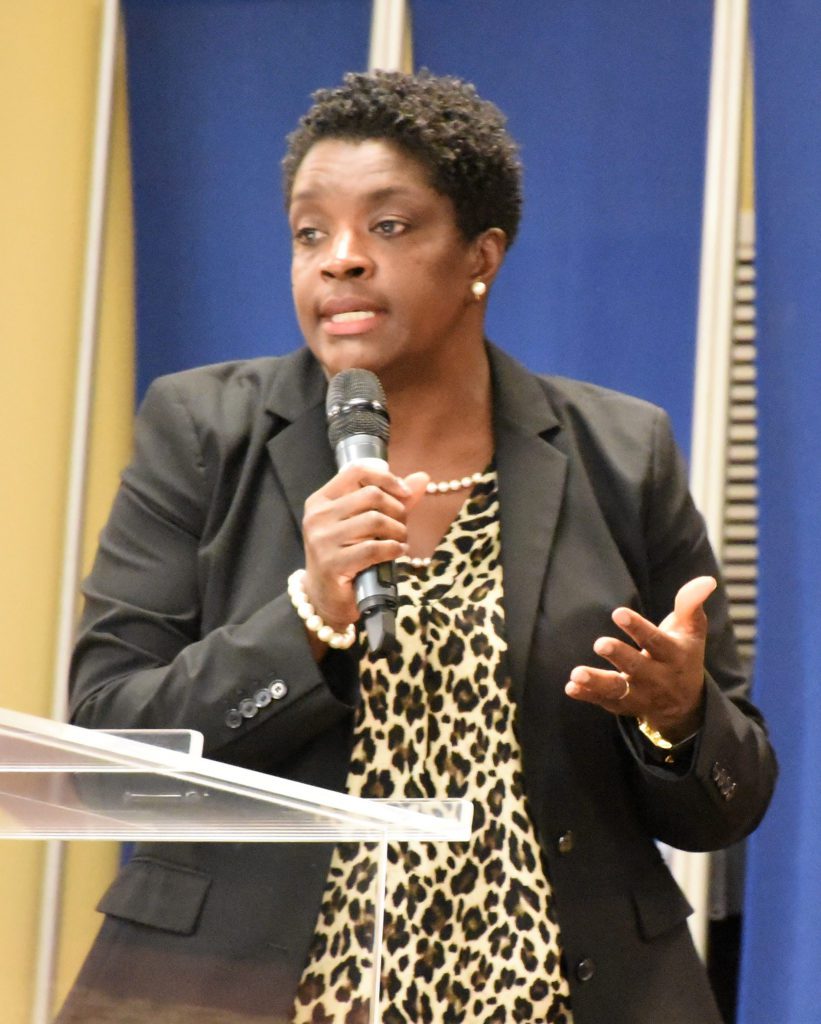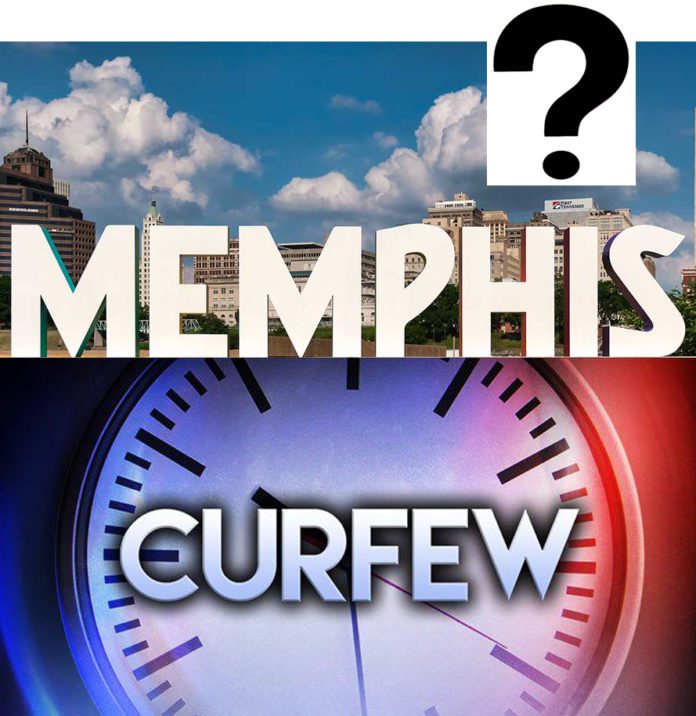After a year of exponential growth in youth curfew violations and after-hours crime incidents committed by youthful offenders, the Memphis City Council’s Public Safety & Homeland Security Committee adopted a resolution Tuesday (Sept. 27), asking the Memphis Police Department to curb city teens’ nocturnal outings.
The council is scheduled to vote on the resolution at its next meeting on Oct. 11.
Tuesday’s committee approval did not come without some reservations from council members, who voted for approval, even though police brass told committee members the department did not to have the manpower to strictly enforce a curfew.
Other members raised concerns about what would happen to youths caught out after curfew and concerns about selective enforcement.
“The things we have seen among our juveniles has just really alarmed all Memphians. The thing that we do know, if they’re (youths) in the house a lot of this wouldn’t be happening,” said committee chair Rhonda Logan, who sponsored the resolution.
“If they were home under parental supervision, some of these things wouldn’t be happening – these violent crimes we are talking about today.”
In addition to enforcing the Child Curfew Act of 1995, which the council approved in 1996, the resolution asks the MPD and Mayor Jim Strickland’s administration to study other cities’ formulas for addressing similar issues.
It also calls for the creation of a dedicated curfew center. Currently, youths who are picked up by police beyond curfew typically are taken home.
A plan is expected to be presented for a full council vote on Oct. 11.
“One of the big things is, when we pick up the child where do we take them if the parent is not home. Also, we do tie up quite a bit of manpower when we are transporting them back home, but that is a need to get them off the street,” said officer Alexander McGowan.
But, if a parent can’t be contacted, the curfew violators generally are held in place until they can be released from custody, further tying up resources.
Many crimes, from property crimes such as auto theft to violent crimes, also occur during the late night and morning hours. At the council’s previous meeting, police commanders told committee members that many of the vehicle-related crimes were committed by offenders 15-19 years old.
While 911 calls and reports to police dip in those hours, they steadily increase as people wake up.
To address staffing shortages, the council recently asked the state and county to buffer their force with additional officers. The MPD has about 1,900 officers, with a goal of expanding to 2,500 by the end of the year.
“You also have at 1 or 2 o’clock in the morning, where they are not only violating the curfew, but there are other criminal charges. That moves it to a whole another level,” said McGowan.
The other late-night option is Shelby County Juvenile Court. This, however, is usually frowned upon unless it is accompanied by a more serious criminal violation.
“Curfew centers are in other cities, successfully, and this is something we can look at. We already have on the books that they will be taken to Juvenile Court. This (curfew center) is an option for those that may not need to go to juvenile court…,” said Logan.
A centralized resource center would likely be modeled after the Youth and Family Resource Center, which currently oversees referrals for Shelby County.
In addition to curfew violations, there is a list of 12 violations that can result in a child’s referral. The center is limited by operating hours, so if a violation occurs past a certain time of night, which they typically do, the offender remains with the police or courts.
“Having that centralized location for dropping the kids off is really important,” said McGowan. “I don’t think Juvenile Court will be able to take on 20-25 kids. On any given Friday, Saturday, or Sunday night around Beale St. venues, you could easily find 20-25 juveniles who are in violation of curfew.”
Like the rest of the nation, Memphis has seen a rise in youth crime as the pandemic wanes. After lows in 2020-21, the city has experienced a 92 percent surge in juveniles taken into custody for curfew violations.
The rush to address youth curfew violations, although nothing new, has been spurred by a wave of property crimes, carjackings and violence in Memphis. It included the recent shooting spree by Ezekiel Kelly, 19, on Sept. 7 that left three people dead and three seriously injured.
The curfew vote was prefaced by an update by Memphis Police Chief C.J. Davis, who delivered an assessment of the department after a year on the job.
It included discussion about creating a crime lab for MPD. Currently, the Tennessee Bureau of Investigation handles rape kits. The chief also assured council members the department was caught up on outstanding kits.
Other topics covered were drag racing and the recent influx of officers on loan from the state.
“We’ve increased to about 12 (state troopers) in this area and we’ve have seen a very noticeable consistent presence. I’ve been communicating with the Tennessee Highway Patrol our appreciation…,” said Davis.
Tuesday’s committee approval did not come without some reservations from council members, who voted for approval, even though police brass told committee members the department did not to have the manpower to strictly enforce a curfew.
Other members raised concerns about what would happen to youths caught out after curfew and concerns about selective enforcement.

“The things we have seen among our juveniles has just really alarmed all Memphians. The thing that we do know, if they’re (youths) in the house a lot of this wouldn’t be happening,” said committee chair Rhonda Logan, who sponsored the resolution.
“If they were home under parental supervision, some of these things wouldn’t be happening – these violent crimes we are talking about today.”
In addition to enforcing the Child Curfew Act of 1995, which the council approved in 1996, the resolution asks the MPD and Mayor Jim Strickland’s administration to study other cities’ formulas for addressing similar issues.
It also calls for the creation of a dedicated curfew center. Currently, youths who are picked up by police beyond curfew typically are taken home.
A plan is expected to be presented for a full council vote on Oct. 11.
“One of the big things is, when we pick up the child where do we take them if the parent is not home. Also, we do tie up quite a bit of manpower when we are transporting them back home, but that is a need to get them off the street,” said officer Alexander McGowan.
But, if a parent can’t be contacted, the curfew violators generally are held in place until they can be released from custody, further tying up resources.
Many crimes, from property crimes such as auto theft to violent crimes, also occur during the late night and morning hours. At the council’s previous meeting, police commanders told committee members that many of the vehicle-related crimes were committed by offenders 15-19 years old.
While 911 calls and reports to police dip in those hours, they steadily increase as people wake up.
To address staffing shortages, the council recently asked the state and county to buffer their force with additional officers. The MPD has about 1,900 officers, with a goal of expanding to 2,500 by the end of the year.
“You also have at 1 or 2 o’clock in the morning, where they are not only violating the curfew, but there are other criminal charges. That moves it to a whole another level,” said McGowan.
The other late-night option is Shelby County Juvenile Court. This, however, is usually frowned upon unless it is accompanied by a more serious criminal violation.
“Curfew centers are in other cities, successfully, and this is something we can look at. We already have on the books that they will be taken to Juvenile Court. This (curfew center) is an option for those that may not need to go to juvenile court…,” said Logan.
A centralized resource center would likely be modeled after the Youth and Family Resource Center, which currently oversees referrals for Shelby County.
In addition to curfew violations, there is a list of 12 violations that can result in a child’s referral. The center is limited by operating hours, so if a violation occurs past a certain time of night, which they typically do, the offender remains with the police or courts.
“Having that centralized location for dropping the kids off is really important,” said McGowan. “I don’t think Juvenile Court will be able to take on 20-25 kids. On any given Friday, Saturday, or Sunday night around Beale St. venues, you could easily find 20-25 juveniles who are in violation of curfew.”
Like the rest of the nation, Memphis has seen a rise in youth crime as the pandemic wanes. After lows in 2020-21, the city has experienced a 92 percent surge in juveniles taken into custody for curfew violations.
The rush to address youth curfew violations, although nothing new, has been spurred by a wave of property crimes, carjackings and violence in Memphis. It included the recent shooting spree by Ezekiel Kelly, 19, on Sept. 7 that left three people dead and three seriously injured.
The curfew vote was prefaced by an update by Memphis Police Chief C.J. Davis, who delivered an assessment of the department after a year on the job.
It included discussion about creating a crime lab for MPD. Currently, the Tennessee Bureau of Investigation handles rape kits. The chief also assured council members the department was caught up on outstanding kits.
Other topics covered were drag racing and the recent influx of officers on loan from the state.
“We’ve increased to about 12 (state troopers) in this area and we’ve have seen a very noticeable consistent presence. I’ve been communicating with the Tennessee Highway Patrol our appreciation…,” said Davis.


